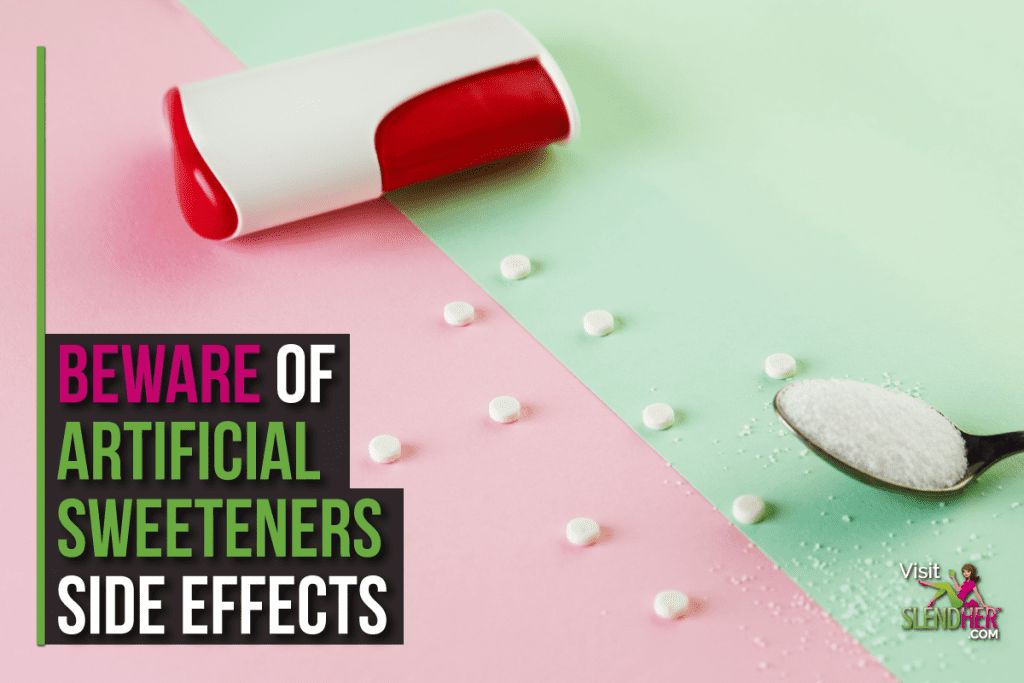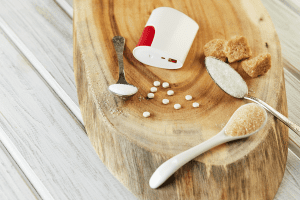
In the world of health, diets and nutrition, you may have heard the supposed dangers of too much sugar and turned to artificial sweeteners in your daily cup of tea and coffee instead. However, is this a healthy choice? Let’s take a look at artificial sweetener side effects to understand the pros and cons to make an informed choice for your health.
What are the Negative Effects of Artificial Sweeteners?
If you are consuming artificial sweeteners to switch out sugar, or are eating foods filled with artificial sweeteners then it is a good idea to understand what they might do to the health of the body.
Consumption of sugar-sweetened drinks has been linked to obesity, type 2 diabetes, and metabolic syndrome — a group of risk factors that raises the risk for heart disease and stroke. As a result, many Americans have turned to artificial sweeteners, which are hundreds of times sweeter than sugar but contain few, if any, calories. However, studies in humans have shown that consumption of artificially sweetened beverages is also associated with obesity, type 2 diabetes, and metabolic syndrome as well as cardiovascular disease. As few as one of these drinks per day is enough to significantly increase the risk for health problems. – Science Daily
As shown here, it is very important to consider what you eat and what you believe is a good choice for adding sweetness to your life.
Here are some potential side effects consuming artificial sweeteners:
- Effect Appetite – Artificial sweeteners are popular among individuals who are trying to lose weight, yet there is some research to show they might actually increase appetite, therefore potentially increasing weight gain. As they taste sweet but lack the calories found in other sweet-tasting food they can confuse the brain and body into still feeling hungry. Check out these studies at PubMed.
- Effect Weight – As noted above, they can “trick” the brain into wanting more food and because the body does not feel satisfied from consuming the sweetener the body craves other food. This can lead to eating more food to make up for that feeling of craving foods, and potentially effect weight gain.
- Metabolic Syndrome – Metabolic syndrome refers to a cluster of medical conditions such as high blood pressure, high blood sugar, abnormal cholesterol levels, and excess belly fat. These conditions increase the risk for heart disease, stroke and type 2 diabetes. Some studies suggest that drinking diet soda, which has artificial sweeteners, can increase metabolic syndrome.
- Headaches and Depression – Many studies on the side effects of artificial sweeteners are inconclusive, however, there are people reporting issues after eating foods with sweeteners such as aspartame. Some people with mood disorders may be more sensitive to symptoms from aspartame consumption, as shown in this study, Pub Med.

“What About Stevia? Isn’t that Safer?”
Many people choose to replace sugar with stevia to reduce calorie consumption. Stevia is a non-nutritive, zero-calorie sweetener made of steviol glycosides, which is a compound extracted and refined from the leaves of the stevia rebaudiana plant. Stevia leaves are about 200 times sweeter than traditional white sugar, therefore a little goes a long way when using stevia as a sugar replacement. Stevia has been used for centuries as a sweetener and should be considered safe for human consumption.
However, here are two potential side effects linked to stevia consumption, such as:
Gut Microbiome Issues
Although non-nutritive sweeteners (NNSs) are considered safe and well tolerated, their effects on glucose intolerance, the activation of sweet taste receptors, and alterations to the composition of the intestinal microbiota are controversial. So far, only saccharin and sucralose (NNSs) and stevia (NS) change the composition of the gut microbiota. – PubMed
Gastrointestinal Symptoms
Some stevia products contain added sugar alcohols which may cause issues for individuals with sensitivities to these chemicals. Symptoms include: nausea, vomiting, bloating and cramping.
What is the Safest Artificial Sweetener to Use?

Artificial sweeteners can be found in many foods and drinks from diet sodas to low-calorie baked goods to sports drinks to energy drinks. There is a lot of controversy surrounding these sweeteners and there is still a lot we don’t know as the FDA approved sweeteners have been studied on lab rodents (not humans).
Here are the FDA approved artificial sweeteners:
- Aspartame
- Saccharine
- Sucralose
- Neotame
- Acesulfame-K
- Stevia
- Luo Han Guo fruit extracts
- Advantame
Whether these are the best sweeteners to enjoy for daily usage remains to be answered, but they are classed as the safest artificial sweeteners.
What is the Healthiest Sugar Substitute?

We all know eating too much sugar is not the best for our health; however, is there a place in our diet to enjoy a little sugar in a delicious homemade cake rather than eating daily artificial sweeteners. It as an open-ended question as only you can decide what you believe is best for your health.
That being said, there are many options for adding sweetness to your drinks and food. First and foremost is fruit. Fresh fruit is the best option for adding sweet flavours to your nutrition. Eat it raw, cook it, and use it for baking. Bananas and dates are excellent for adding sweetness to cakes and smoothies. Other great sweet alternatives deemed healthier due to better nutrient profiles compared to white sugar are coconut sugar, maple syrup, agave syrup, honey, and unrefined sugar.
For healthy eating inspiration, check out these posts:
- 7 Tips for Cutting Out Sugar for Weight Loss
- What is High Fructose Corn Syrup?
- Discretionary Calories and Fat Loss

Leave a Reply